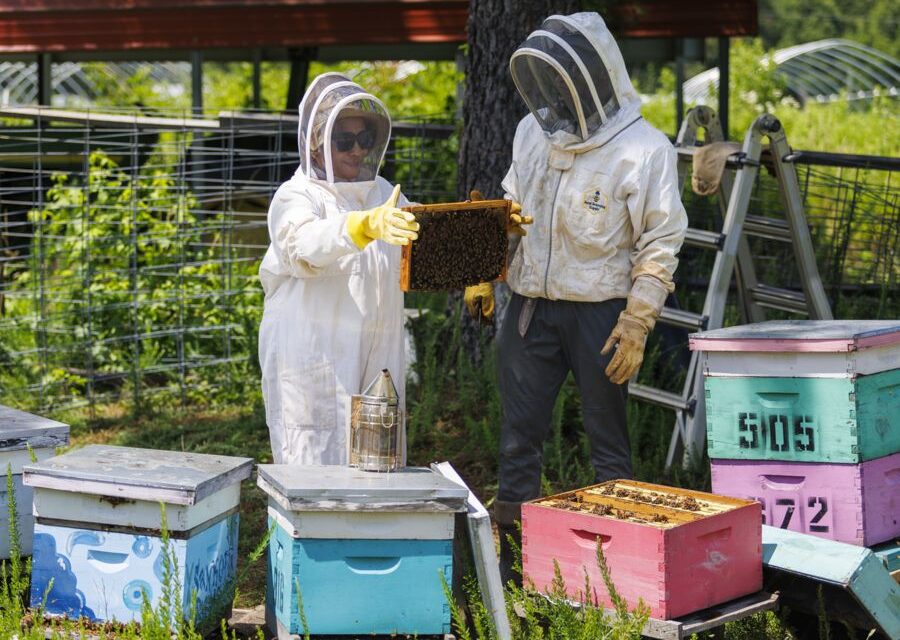EASTERN NORTH CAROLINA — Power was a central theme of the 2025 Cooperative Extension Eastern Region Tour. The power of research, of persistence, of science, of education and of community.
About 20 people on the June 17-18 bus tour joined dozens more at various stops featuring farms, agricultural research, 4-H STEM demonstrations and a community listening session. The tour included stops in Granville, Warren, Pitt, Wayne and Orange counties.
“We call our organization Cooperative Extension because we are a collaborative partnership between our two land-grant universities and our 101 local county governments,” Pitt County Extension Director Matt Stevens told the group. Extension agents are in every county and the Eastern Band of Cherokee Indians.

2025 Small Farmer of the Year Elvin Eaton tells the crowd about growing practices at Fairport Farms, which he owns with his wife, Madeline. Fairport Farms was a stop on Cooperative Extension at N.C. A&T’s Eastern Region Tour.
At the Oxford Armory Farmers Market in Granville County, participants were treated to fresh peach coolers created and served by local children learning about food and nutrition through the SNAP-Ed program. Just steps away, 2025 Small Farmer of the Year Elvin Eaton of Fairport Farms displayed produce from his farm and told the group how his farm provides high-quality food to those in need.
“We can’t afford to give everything away, but we try our best to make sure that what we do is good … for the success of our farm and to feed those who really need the most nutrient-dense food,” he said.
Some of Eaton’s produce goes to the Farm to Fridge program — featured at the adjacent Richard H. Thornton Library — which was also part of the tour. That Extension program features refrigerators in three county libraries that are stocked with eggs and fresh produce that is free for anyone to pick up.
The tour also featured a stop at Brown Family Farms, operated by 2024 Co-Small Farmer of the Year Patrick Brown. Brown explained how his farm’s industrial hemp crop is used in building insulation, press boards and fabric production and, as a natural absorbent, is used to clean up oil spills in mechanical shops.
He emphasized the importance of education in farming. “It’s always important to be able to support ways for the next generation of farmers to be able to be innovative, to be able to work with their minds and their hands in order to be successful,” Brown said.
In Warren County, youths participating in 4-H STEM programs coached tour participants in operating land and aerial drones, demonstrating the use of artificial intelligence and a geographic information system to solve community problems and enhance classroom education.
The Pitt County stop included an evening dialogue with community members about how Extension can help them and where there might be gaps.
“Working together — N.C. A&T, N.C. State, and our counties — is truly the heart of what makes us the great Cooperative Extension,” said Sandy Hall, Northeast District Extension director. “It’s how we bring the vital research-based learning and direct face-to-face support that goes far beyond the Google search and ChatGPT, in helping communities address their real-world challenges.”
Day two of the event featured organic farming and the use of high tunnels, which included tours of Cherry Research Farm in Goldsboro and Sankofa Farms in Efland. Kamal Bell, ’14, ’15, owner of Sankofa Farms, talked about the difficulties he encountered as a Black Farmer when trying to get a loan to start his venture. With the help of a civil rights attorney, he ultimately was able to secure the money to buy the 12-acre farm nine years ago.
Since then, he’s written a children’s book about beekeeping and has met with several federal officials, including former U.S. Secretary of Agriculture Tom Vilsack and former Vice President Kamala Harris.
“I was able to advocate and use my voice to talk about the things that we see that are wrong,” said Bell.
Bell offered then-Provost and Executive Vice Chancellor of Academic Affairs Tonya Smith-Jackson a chance to don a beekeeper’s suit and examine his hives more closely.
Smith-Jackson agreed, but with a caveat.
“This was not on the itinerary, that’s all I have to say,” she said with a smile.
















